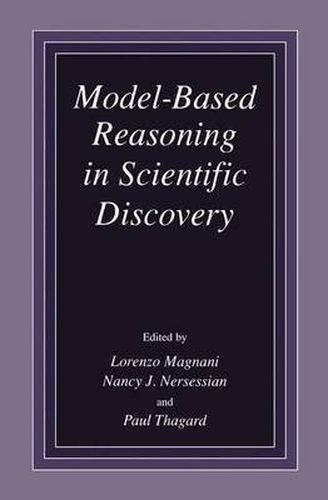Model-Based Reasoning in Scientific Discovery

Model-Based Reasoning in Scientific Discovery
This title is printed to order. This book may have been self-published. If so, we cannot guarantee the quality of the content. In the main most books will have gone through the editing process however some may not. We therefore suggest that you be aware of this before ordering this book. If in doubt check either the author or publisher’s details as we are unable to accept any returns unless they are faulty. Please contact us if you have any questions.
This text aims to explain how specific modelling practices employed by scientists are productive methods of creative changes in science. The study of diagnostic, visual, spatial, analogical, and temporal reasoning has demonstrated that there are many ways of performing intelligent and creative reasoning which cannot be described by classical logic alone. The study of these methods of reasoning is situated at the crossroads of philosophy, artificial intelligence, cognitive psychology, and logic: at the heart of cognitive science. Model-based reasoning promotes conceptual change because it is effective in abstracting, generating, and integrating constraints in ways that produce novel results. There are several key ingredients common to the various forms of model-based reasoning to be considered in this presentation. The models are intended as interpretations of target physical systems, processes, phenomena, or situations. The models are retrieved or constructed on the basis of potentially satisfying salient constraints of the target domain. In the modelling process, various forms of abstraction, such as limiting case, idealization, generalization, and generic modelling are utilized. Evaluation and adaptation take place in the light of structural of structural, causal, and/or functional constraint satisfaction and enhanced understanding of the target problem is obtained through the modelling process. Simulation can be used to produce new states and enable evaluation of behaviours, constraint satisfaction, and other factors. The book also addresses some of the main aspects of the concept of abduction, connecting it to the central epistemological question of hypothesis withdrawal in science and model-based reasoning, where abductive interferences exhibit their cognitive virtues. The recent results and achievements in the above areas are illustrated in detail by the various contributors to the work, who are researchers in philosophy, artificial intelligence and cognitive science.
This item is not currently in-stock. It can be ordered online and is expected to ship in 7-14 days
Our stock data is updated periodically, and availability may change throughout the day for in-demand items. Please call the relevant shop for the most current stock information. Prices are subject to change without notice.
Sign in or become a Readings Member to add this title to a wishlist.

